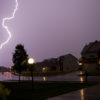Spring and early summer are some of the most exciting times of the year for pool loving people. If you look forward to it, you probably cannot wait to see budding flowers start to bloom. Outdoor events also take place, making it a great time for people to get out of their homes and have fun by their pools.
One thing that you do not want to see though is pollen, especially in your swimming pool. If you or someone in your home is an allergy sufferer, pollen can make you feel miserable. During this season, pollen is in the air and can go straight to your pool.
Pool Troopers gives you an in-depth look at what pollen is and the best ways to remove it from your pool.
What is Pollen?
Simply put, pollen is defined as small spores that originate from plants in the reproductive process. These pollen seeds are the male microgametes of a plant which are transported by wind, insect or other animals to fertilize the female ovules of plants in the same species.
You will recognize the catkins, which are the remaining part of flowering trees male pollinating system, covering your cars and paths after it has fallen from the tree. They make it almost unbearable for people who suffer from allergies.
Pollen comes in two different types. The first one is known as sticky pollen, which comes from plants with ornamental flowers. Bees transport the pollen to other plants for fertilization. The second type is wind-blown pollen, which comes from pine, oak, and other large trees.
Oak trees may be beautiful to look at, but pollen season makes them one of the most dreadful things for allergy sufferers. It can also hurt the pool in your yard. With pollen season in full bloom, it is the perfect time for you to do some spring cleaning. It helps avoid the unnecessary trouble that comes with pollen in your pool.
Oak Trees and Their Blooming Season
In general, oak trees start to bloom in March in southern states but the start of the season is weather dependent. They begin producing flowers once they are about 20 years old. It may be late maturity compared to other trees, but they do age gracefully. In fact, these trees produce more flowers and acorns as they grow older.
Oak trees are the same as other deciduous trees where their leaves fall off. In spring, however, oaks show their flowers. Each tree has both male and female flowers. The latter commonly emerge near the top part of the tree. They tend to be small and unremarkable. On the other hand, male flowers are quite visible with the yellow-green catkins hanging at the tip of the branches. They will soon release pollen for about two weeks, causing allergy sufferers and pool owners a headache.
Why You Need to Get Rid of Pollen from Your Swimming Pool Quickly
You do not need to have oak trees to see pollen in your pool. Your neighbors might have them and pollen can easily travel with the help of the wind. It can land straight into your pool, causing mayhem. You may not notice it or even ignore it until the problem gets worse.
It does not have to be too complicated, simply put, pollen is not a good addition to your pool. It is bad, plain and simple. As organic matter, it uses up your pool’s sanitizer and can lead to algae if you leave it alone. Pollen and the catkins can also remain in the filter and baskets, causing them to clog. If you do not remove the pollen, it can quickly make your pool dirty.
It may seem that it happened overnight where the sparkling blue water suddenly turned green. You do not want it to reach that stage, which is why you should try to correct the problem right away. But if it is a bad pollen season your pool may get overwhelmed.
Algae thrive when your swimming pool is low on chlorine. If you have neglected your pool cleaning responsibilities for some time now, you will certainly see algae growing. Other contributors include:
• Having an undersized pump, or running your system for too few hours
• Using an undersized or older filter
Before algae, pollen can stress out your pool on its own. It can lead to certain problems, such as the water needing more chlorine and gives it an ugly yellow to green tint. Without a doubt, more pollen means more work for your pool, its equipment and you!
Tips from Pool Troopers on How to Get Pollen Out of Pool Water
Spring may not always be the time for celebration, since you may need to clean the baskets and filter more frequently. You also need to net the surface of the swimming pool more times than before. Also, it will require more chemicals for treatment. You can already tell that pollen season is time for pool cleaning and maintenance.
For Pool Troopers, it is best to be ready for allergy season even before it starts. Here are some tips that you will truly benefit from:
• Replace your cartridge filter element or have your DE filter serviced before this stressful time on your pool equipment. A yearly element replacement is enough for maintaining your cartridge pool filter and cleaning it frequently will help. Pool Troopers is the company to trust with this maintenance task if it’s not something you want to do yourself.
• Check the baskets. Spring and summer require your skimmers to work properly. Pool Troopers can also empty and clean them for you, but this time a year they may need to be emptied multiple times a week or even each day during heavy pollen seasons. Before the pollen season is when you should ensure they are not broken or malfunctioning – replace broken baskets and skimmer weirs.
• Inspect all your equipment. Pump lids, filters, drain covers, pressure gauge, and all the others should be working properly before spring ends. This way, you will have no issues when summer comes in. Pool Troopers offers this in an annual Spring Special to all Clients for reduced costs to help you get the pool into shape.
• Start pruning. Before the pollen season, be sure to get rid of long branches, twigs, and leaves around your pool. You will save yourself cleaning them out of your pool later.
• Get the necessary supplies. You should have chemicals and a current test kit to ensure that your pool is well-maintained during spring (and all year round). List the supplies you need before you purchase. Make sure that your pool tools are all working, such as robotic cleaners and vacuums.
• Keep your pool water level at the correct height during this season when you are cleaning out your skimmer baskets frequently. That way your skimmer will take out the most pollen before it sinks to the floor of the pool.
• Shock the pool. As mentioned, pollen is organic matter and uses up your pool’s sanitizer. Regular doses of a chlorinating compound may be necessary this season to keep your pool from turning the yellow green pollen color or developing algae.
There is indeed a lot of work involved in maintaining your pool during the pollen or spring season. However, the good news here is that it is not a permanent problem that you have to deal with. It will go away, usually in just a couple of weeks or so.
Unfortunately, it is not possible for you to prevent pollen from falling and getting into your pool. Springtime is when it typically collects along your pool’s waterline. It is why some owners simply let the season run its course, then clean up the water once the period is over. The point is not to stress yourself out.
Pool maintenance is a lot of work, which is why it is best to call the experts. If pollen is harming your pool, schedule a filter cleaning, along with other services. This way, your pool will be ready for the swim season.
If you want a worry-free cleaning, maintenance, and chemical service, Pool Troopers is the answer. There are no contracts ever but you can be sure that you will only deal with reliable professionals. The company has been around since 1952. You can count on the experience of the team to ensure a safe and pollen-free pool.



